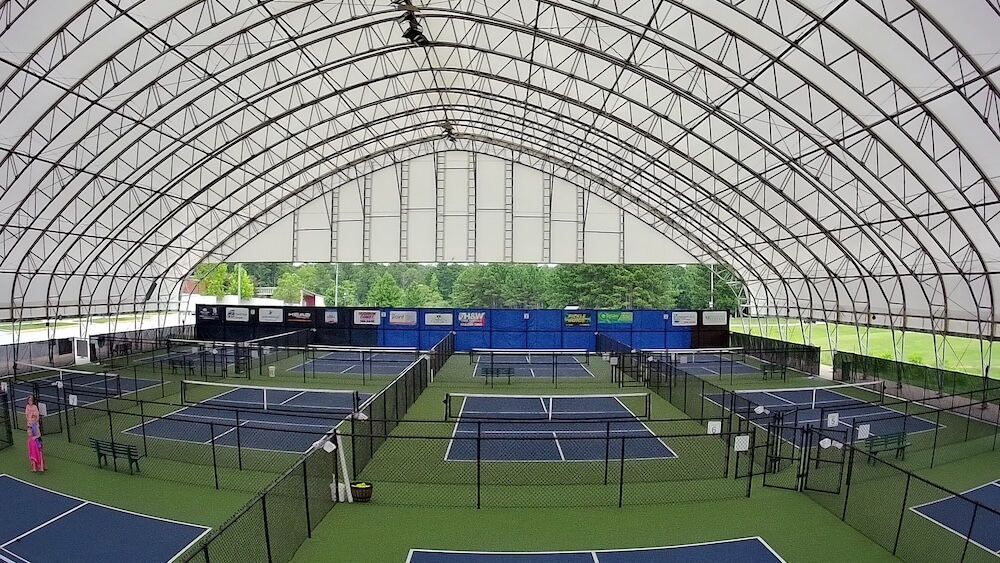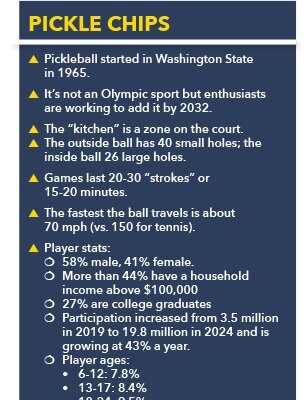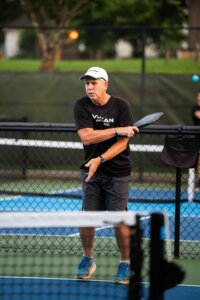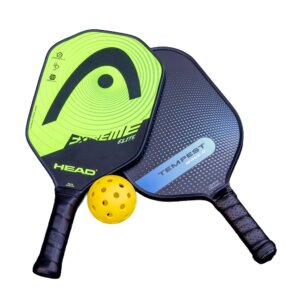
For some, that distinctive dink-dink-dink coming from the paddleball court is the sound of money.
People who don’t associate pickleball with income ought to think again. Across Alabama, cities are scrambling to build public courts to attract lucrative tournaments and overnight visitors. Private businesses are opening indoor courts that charge fees. Entrepreneurs are selling private lessons. Construction companies are building private courts in back yards.
According to the player website Pickleheads, Alabama has 242 locations with 1,072 public and private courts.
Dothan broke ground on a $6.4 million covered pickleball complex in May with expectations of a $2 million yearly economic impact. Montgomery is spending $920,000 on 12 courts. The Tuscaloosa area is getting eight new courts and an adjacent parking lot for $1.4 million. Huntsville is adding 25 more public courts. Foley opened 12 courts in June. The University of Alabama is spending $1.6 million to add 10 pickleball courts at its tennis complex to “keep pace with innovative recreational trends.” Birmingham has roughly 70 courts, including the private 10-court Picklr in Vestavia Hills, a franchise owned by football player Drew Brees.
Construction companies are installing private courts now. Procourt Construction, in north Alabama, recently built a two-court lighted facility for $80,000.
Jim Young is president of the 700-member Opelika Pickleball Club and tournament director at one of the state’s most popular pickleball locations.
Opelika has 24 courts and nine more under construction. For three of the last four years, the local club has been so successful with tournaments that it gave money back to the community.
“It is in our charter and bylaws to give all our proceeds back to the city because the city invested over $3 million in these facilities,” says Young.
Auburn-Opelika Tourism estimates the local and state economic impact from the big 2022 Paddles at the Plex tournament was $800,000. In 2024, the sport brought in $665,000. Their first tournament, in March 2020 — just before COVID-19 lockdowns — lured 221 players to 12 courts.
After the initial courts became popular, the local pickleball contingent offered the city $5,000 a year to build restrooms. Someone suggested adding 12 more courts while they were at it.
“That’s how we got our 24 courts, and we’ve been running tournaments and giving them checks for $60,000 for the last three years prior to last year,” Young says. “Last year we gave them a check for a hundred thousand bucks.”
Before tournaments became popular around the country, Opelika was a top 10 playing destination, Young says. More than 900 players representing 26 states competed in one tournament.
“People didn’t want to put tournaments in competition with us, but we don’t want to put competition against others either,” he says.

Some pickleball lovers are making life-changing decisions connected with the sport. People have retired in the Opelika area because of the game culture, Young says. One couple sold their house in Wisconsin and moved there.
The Alabama Tourism Department isn’t tracking the economic impact of pickleball tournaments and travelers — yet.
Orange Beach is about to start a $1.5 million project off Canal Road with 14 free, lighted courts and restrooms. Parks and Recreation Director Nicole Ard says the city began its pickleball program about 10 years ago in a gymnasium. Three courts fit in a regulation-size gym, she says, and they have two.
“We were able to get six courts in those gymnasiums, which is great because it is air-conditioned and there’s a certain type of public that likes it,” she says.
Use of gym courts is included in a wellness program that costs residents $75 a year, or $10 a day. The indoor courts will stay open after the outdoor ones are ready.
“The folks that play indoors don’t want that taken away, and we are not taking that away,” Ard says. Gym space is in demand by others, too, which limits court time.
“The happy medium is building those courts because the demand is just there by the public,” says Ard.
In nearby Mobile, tennis is still king, says Mobile Sports Authority Executive Director Danny Corte, but city leaders are adding pickleball courts “as fast as we can.”

Chris Welch and his business partner Greg Boyett, both former tennis players, started C&G Pickleball Academy about five years ago in Huntsville. In a smart PR move, they offered a clinic for city council members of adjacent Madison. They offered free lessons to the public at first, too.
Early on, it seemed like a good idea to get certified and licensed by the International Pickleball Federation and charge for lessons because “this thing might get big,” Welch recalls.
Their business has been steady for the last two or three years, he says, with paid lessons for 8 to 12 people several times a week.
Welch describes the sport as a combination of racquetball, tennis and ping-pong, with less running than tennis.
“Everybody has kind of got the fever for it,” he says. “It’s just easy to play.
“There’s a hunger for this sport like nothing I’ve ever seen before,” says Welch, a former newspaper sportswriter. “I’m talking about people that tell me they would play 24/7, every single second they have free. I call it the pickleball obsession.”
Welch and Boyett realize many people try the game without knowing the rules. They start with the basics.
“People come to me, ‘I want to know about this game. I want you to teach me. I want to be good tomorrow,’” Welch says.
Even people who just want to goof around can have fun, Welch says, and “whack, whack, whack and have a great time.”
Paddles are as cheap as $15, but good carbon fiber can set you back $300.
Boyett built a court in his pasture. “I’ll look up and there’s like three llamas looking over the fence,” Welch says.
Tennis and pickleball players are already fighting over courts in many places, Welch says. “They don’t like it when we put little lines on their courts.”
The sound apparently bothers them, too. In Laguna Beach, California, quiet paddles are now required because of noise complaints.
Prattville held its first pickleball tournament this year, according to Kellie Carter, director of Parks and Recreation. They built the first four courts from scratch.
“As soon as we constructed the four, we immediately realized that that was not enough,” she says. “We had five tennis courts that were set to be refurbished, and we actually took those tennis courts and converted them to pickleball courts. And now we are building five new tennis courts.”

She already knows 18 more isn’t enough.
“The biggest thing for us is everybody from teenagers to senior adults seem to love pickleball,” Carter says. “Even this tournament that we had this past Saturday, we saw a mix of every age out there represented.”
Ard agrees that pickleball is a game for everyone.
“It’s the fastest-growing sport in the nation right now from youth to seniors,” Ard says. “All communities, if they don’t have a pickleball court, they need to. There’s an active community of pickleball players in every corner of the universe at this point.”
New courts are a draw for snowbirds in Orange Beach, but leaders keep the locals foremost in their minds.
“We’re building our courts across from an elementary school,” Ard says. “We hope to integrate those programs into our youth programs as well and let them come over for PE and play.”
In Opelika, the nonprofit volunteer club started by putting on three six-day tournaments but since streamlined to two and Alabama Senior Olympics games.
To keep tournament players coming back, Young says cities should make them feel welcome with meal vouchers, restroom access and covered courts if possible.
Their city-affiliated competitions don’t offer cash prizes, but a trend for “moneyball” games is emerging. Opelika public courts provide free balls and beginner lessons.
“I bought 7,000 balls last year at one time,” he says.
When some traveling players stopped by, Young’s club directed them to stay at the city-owned RV park.
“It’s just good for the economy,” he says.
Deborah Storey is a Huntsville-based freelance contributor to Business Alabama.
This article appears in the September 2025 issue of Business Alabama.



